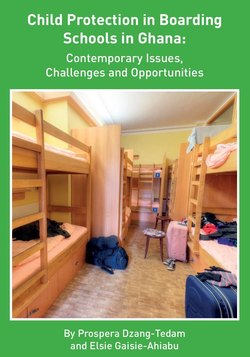Читать книгу Child Protection in Boarding Schools in Ghana - Prospera Dzang-Tedam - Страница 10
На сайте Литреса книга снята с продажи.
ОглавлениеChapter 3Ghana (Location, Background & Governance)
Ghana is located on the West Coast of Africa, bordered by three French-speaking countries (Togo, Cote d’Ivoire and Burkina Faso). It has been described as a middle-income country (Gylfason, 2011) and was the first Black African country to gain independence in 1957 from Britain. Ghana has a total population of approximately 23.5 million, with children constituting the single largest sub-group, estimated to be about 50 per cent (UNICEF 2011).
For this reason, Ghana is often referred to as having a ‘youthful population’ (Ashford 2007). In terms of the economy, Ghana is one of the world’s leading producers of cocoa, coffee and sugar, and more recently crude oil. Ghanaian migration, both internally and internationally is not a new phenomenon. It has been argued that Ghana’s internal migration from Northern to Southern Ghana is a legacy of the colonial British administration, which promoted and sustained the mining, cocoa and fishing industries in the South of Ghana, with labour from the North. This legacy continues today, with many people from Northern Ghana migrating to the South in search of employment, education and improved standards of living (Ackah and Medvedev 2012). Children and young people have recently joined this migratory population, according to Kwankye (2012) and there is concern about their safety and well-being especially as the majority are migrating alone, increasing their vulnerability and risking their safety.
Figure 1 Map of Ghana, Secondary Schools by Region
The map of Ghana is depicted with numbers of secondary schools per region identified
Source: Ghana Education Service (2017). Register of Programmes for Public Senior High Schools. Pages1-20.
Bodomo (1996) investigated the language situation in Ghana and concluded that there are ten major language groups, which are: Akan, Mabia, Gbe, Ga-Dangbe, Gurma, Guang, Nzema, Grusi, Buem and Nafaanra. He noted that these groups are further split into subgroups, taking the total number of languages spoken in Ghana to between 60 and 80, depending on the individual researcher’s distinctions between language and dialects. He acknowledges English as the country’s official language, a legacy of the British colonisers, used as the medium of instruction in all schools and at all levels within the Education system in Ghana. Whilst there have been unsuccessful attempts to select an indigenous language as the nation’s official language, the debates regarding the pros and cons of such a move are ongoing.
In another study, Bodomo et al. (2009) argued that Ghana is a multilingual country, where it is common to find people who speak more than one language. The study also reveals that, there are increasing numbers of people speaking French (compulsorily taught in some schools due to neighbouring countries speaking French), Arabic (due to Islamic schools and growing numbers of Lebanese businesses) and since 2009, the introduction of Chinese language in Higher Education Institutions due to the growing Chinese population in Ghana.
Governance
According to Botts and Owusu (2013), the government of Ghana is a constitutional democracy headed by an elected president. Members of Parliament are elected to 4-year terms. There are 275 seats in Parliament representing 10 regions and 216 districts. At the time of writing, the country is governed by the National Patriotic Party (NPP) who won the 2016 elections by a clear majority.
Ghana has earned international credit as a model of political stability, good governance and democratic openness, according to UNICEF (2010). Ghana sets itself apart from most of the countries in sub-Saharan Africa because its citizens enjoy political rights, civil liberties, a free press and access to a justice system (UNICEF 2010).
In terms of its economic growth, Ghana attained Middle Income status in 2010, following the re-basing of the GDP with GDP increased from 753 billion to 1318 billion US Dollars. The first oil was harvested from the Jubilee Oil Fields, providing additional revenue to enhance Ghana’s development efforts in many areas. This oil harvest, according to Gylfason (2011) offers opportunities for Ghana to develop its infrastructure and ensure fair access to the benefits derived from the trade in oil.
Learning checks
What have you learned from this chapter?
What did you know before?
